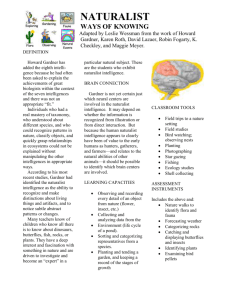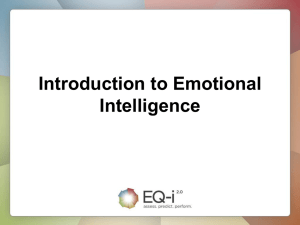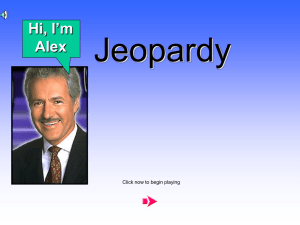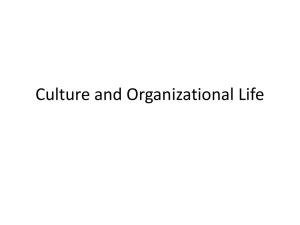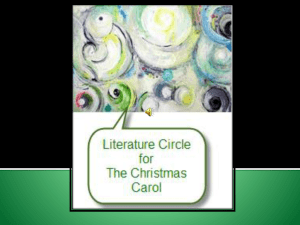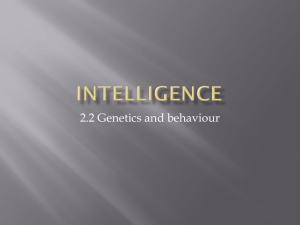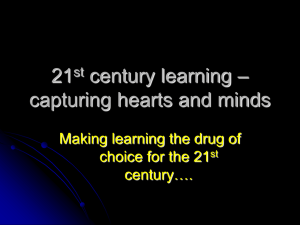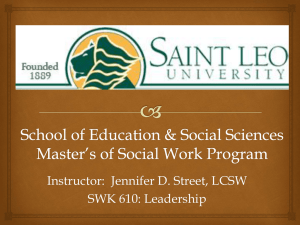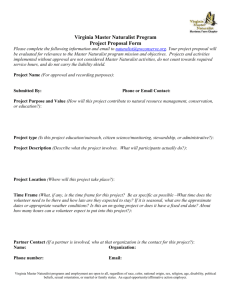Establishing a Culture of Achievement
advertisement
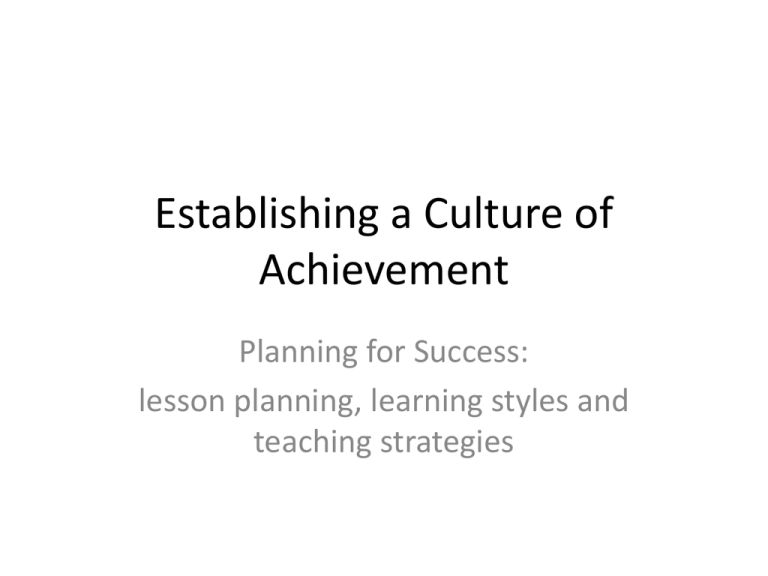
Establishing a Culture of Achievement Planning for Success: lesson planning, learning styles and teaching strategies Session #3 in our Series Overview of the Day • Review of Session #2 • Brief review of concepts and ideas from Sessions #1 and #2 • Sharing of lesson plans/activities/experiences based upon Session #2 • Naturalist Intelligence • What activities could support this Intelligence? Another busy day • Please engage actively by talking to your partner when asked. • Please be prepared to share from each site several times during the session. • If you have never spoken before in a session, try to share something today. Responsibilities at each site • We will ask you to contribute to our overall discussion about 5 times. • You will not answer all questions at the same time. • Please wait until we ask you. So that you can prepare --• Question 1: How do Gagné’s 9 Events help you as you plan for teaching? • Question 2: Why is Interpersonal Intelligence important, not only in the classroom, but in life? • Question 3: Sharing of a) using a text from your classes, b) focusing one of the 9 Events and c) making it more interpersonal. A review of Session #2 • Gagne’s 9 Events: – – – – – – – – – Gain attention Describe the goal Stimulate recall of prior knowledge Present the material to be learned Provide guidance for learning Elicit performance practice Provide informative feedback Assess performance Enhance retention and transfer Question #1 • How do Gagné’s 9 Events help you as you plan for teaching? • What is challenging about the 9 Events? • Do you have any questions about them? • We’ll hear from each of the 3 sites. Question #2 • Why is Interpersonal Intelligence important, not only in the classroom, but in life? • What things can we do in the classroom to help develop it? • This is a general question – we are not sharing experiences yet. • We’ll hear from the three sites. Question #3 • Question 3: Sharing of. . . – a) using a text from your classes, – b) focusing one of the 9 Events and – c) making it more interpersonal. – Once again, we’ll hear from each of the 3 sites. Today’s Focus • Naturalist Intelligence • Non-linguistic representation • Cues, Quotations, Advance Organizers What is Naturalist Intelligence? • Look at the “Common Characteristics” from the handout. • Share with a partner. • Is Naturalist Intelligence strong for you? • Can you give an example of a student you have had who had strong Naturalist Intelligence? Some indicators of Naturalist Intelligence • The individual: – Is bothered by pollution – Enjoys having pets – Likes to be outside – Likes to learn about nature – Notices things / changes in nature – Very conscious of weather patterns A question for us all. . . • Is naturalist intelligence a “true” 8th intelligence? • Or. . . Is it an interest? • Couldn’t this be said about many of the intelligences such as: rhythmic/musical, mathematical etc.? • Your thoughts – from all three sites. Some Best Practices from Research • Non-linguistic representations • Cues, Questions, Advance Organizers Non-linguistic representations • • • • • You already know about these. Graphs Venn Diagrams Pie Charts Etc. Can include words – but the visual is as important Healthy lifestyle • Brings Healthy body and mind • Giving us Longer life and greater wellbeing • Greater wellbeing Less words – more imagery 2 1 3 Greater Wellbeing Weighing the balance Person1 Person2 Cues, questions, advance organizers • Cues = clues, guidelines and/or tips • Advance organizers can include stimulating background information and prior knowledge. Also can include information to encourage students to predict or try to figure out what is coming next. A focus on questions • Questions can arise from many topic areas including: – Things/people – Actions – Events – States of being • From Classroom Instruction that Works, Marzano, Pickering and Pollack, 2001 Things/people • What action does X or Y usually do? • How is X usually used? • What is X a part of? Actions • What usually happens with X or Y? • What effect does one action have on another? Working from the Sample Texts • Back to Say Hello 6, page 113 – “Pichit and Sam’s plans” • What questions could you ask students? – About things or people – About actions – About events? Sharing from each site. Final contributions from each site • What are your ideas about asking questions? • What makes a question a “good question”? Assignment for Next Time • Observe carefully your students and your classes. Reflect on the following questions and bring examples, if you can. Verbal examples are fine – you don’t need to have something written down: – Are there ways you can increase access to Naturalistic Intelligence in your classes? – Can you show ways that you use questions to help students find their own answers? Good luck until next time • • • • Friday, 1 March Ajarn Shei will be here to work with you. Teach Well, Reflect Well – Do good work! Best wishes until I see you again.

